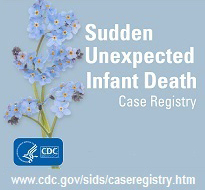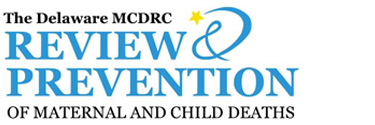Types of Death
Drowning
- How to help prevent childhood drowning deaths in and around the home
- CDC Water-Related Injuries: Fact Sheet
- US Consumer Related Product Safety Commission Pool and Spa Safety Publications
Infant Safe Sleeping Practices
- AAP Guidelines
- Delaware's Media Campaign to Address Unsafe Sleeping for Infants
- CDC: SIDS-Safe Sleep Environment
- Caring for Kids: Safe Sleep for Baby
- SIDS Alliance.org: Bedtime Basics
- Tomorrow's Child Michigan SIDS
- Safe Sleep infographic-Parents
- Safe Sleep Infographic-Providers
Delaware's 30 second PSA New
Suicide
- Suicide Prevention Resource Center
- Suicide Prevention Action Network USA
- Suicide Awareness Voices of Education
Fire Deaths
- What do I need to know about kids and fire?
- National Fire Protection Association
- CPSC: Child-Resistant Lighters Bring Down Fire Deaths
Motor Vehicle Deaths
- Keeping Kids Alive
- CDC Community-Based Interventions to Reduce Motor Vehicle-Related Injuries
- National Highway Traffic Safety Administration
Fetal and Infant Mortality Review (FIMR)
Beginning in the mid 1990's, Delaware's infant mortality rate was increasing while the national trend was decreasing annually. This trend prompted Governor Minner to convene an Infant Mortality Task Force (IMTF) in June 2004. In the Task Force's Report of May 2005, implementation of "a comprehensive review of every fetal and infant death in Delaware" was the first recommendation.
The overall goal of Fetal and Infant Mortality Review (FIMR) is to enhance the health and well-being of women, infants and their families by improving community resources and service delivery systems available to them. The Fetal and Infant Mortality Review (FIMR) process brings together key members of the community (comprising the case review team/CRT) to review information from individual cases of fetal and infant death in order to identify the factors associated with those deaths, determine if they represent system problems that require change, develop recommendations for change and assist in the implementation of change. All case information is de-identified and reviews remain confidential.
The purpose of these reviews is to understand how a wide array of local social, economic, public health, educational, environmental and safety issues relate to the tragedy of infant loss.
Key steps in the FIMR process include:
- Information about the fetal/infant death is collected through public health data and medical records. They are reviewed by a Registered Nurse.
- An interview is conducted with the mother who suffered the loss by a Senior Medical Social Worker. Referrals for bereavement support and community resources are offered.
- The CRT comprised of health professionals, social service professionals and other experts from the community review the case summary and interview, identify issues and make recommendations for community change if necessary.
- The Community Action Team (CAT) is a diverse group of community leaders review the CRT recommendations and implement interventions to improve service systems and resources. FIMR utilizes the subcommittees under the Delaware Healthy Mother and Infant Consortium as their community action teams.
FIMR exists under the authority of the Child Death Review Commission (CDRC) in Delaware and is charged with reviewing all deaths of children up to the age of 18 years. In recent years, the statute was revised and expanded to include fetal and infant deaths occurring as early as 20 weeks gestation. The FIMR staff includes the RN FIMR Program Coordinator, the Senior Medical Social Worker and an Administrative Specialist who report directly to the Executive Director of the CDRC.
The FIMR process is action oriented, a community coalition, a voice for families in Delaware and is supported by the American College of Obstetricians and Gynecologists (ACOG), the March of Dimes Birth Defects Foundation and the federal Maternal and Child Health Bureau.
Unique Features
- Assessment of medical records, birth certificates, and death certificates
- Interviews with mothers and their families
Maternal Mortality Review (MMR)
Over the last ten years, there has been zero to four maternal deaths reported by the Delaware Office of Vital Statistics annually. A maternal death, also known as a pregnancy-associated death, is defined as the death of a woman while pregnant or within one year of the end of her pregnancy, irrespective of cause. In Delaware, the CDRC received statutory authority to review maternal deaths in 2011. In that year, the CDRC instituted an MMR process for reviewing select maternal deaths occurring after July 1, 2008. The goal of MMR is to conduct in-depth, multidisciplinary reviews of pregnancy-related deaths and some pregnancy-associated deaths to achieve the following objectives:
- Describe and track factors associated with maternal deaths in Delaware;
- Identify system-wide issues that may have contributed to the deaths;
- Develop and disseminate recommendations for change;
- Assist in the implementation of action steps that will improve the health of mothers in Delaware.
Potential cases for MMR are identified by the pregnancy check box on the death certificate. Initial information is assessed to select cases based on the following criteria:
- Cases with a pregnancy-related cause of death;
- Cases involving proven or suspected domestic violence, substance abuse, suicide or homicide;
- Cases that do not have pending litigation.



